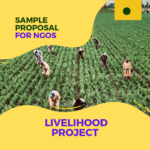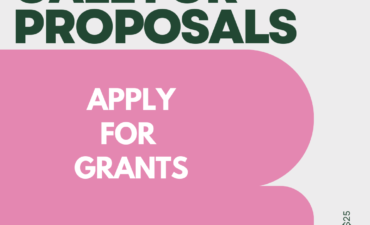Introduction: Sample Proposal for NGOs on Livelihood Project, in an ever-changing world marked by economic uncertainty and social disparities, the role of Non-Governmental Organizations (NGOs) in fostering sustainable livelihoods has become increasingly vital. With a steadfast commitment to empowering marginalized communities and promoting socio-economic development, NGOs stand as beacons of hope, advocating for change and championing initiatives that uplift the most vulnerable.
The proposal herein seeks to outline a comprehensive Livelihood Project aimed at addressing the multifaceted challenges faced by communities grappling with poverty, unemployment, and lack of access to basic resources. Grounded in the principles of inclusivity, empowerment, and sustainability, this project endeavors to create pathways to economic resilience and self-reliance, thereby fostering enduring positive change.
At its core, this proposal recognizes the intrinsic link between livelihood opportunities and human dignity. By harnessing the collective efforts of NGOs, local stakeholders, and community members, we aspire to co-create innovative solutions that not only alleviate immediate hardships but also lay the foundation for long-term prosperity. Through targeted interventions and capacity-building initiatives, we aim to equip individuals and households with the tools, skills, and resources necessary to chart their own course towards a better tomorrow.
Background of the Organization (Sample Proposal for NGOs on Livelihood Project)
NGOscope.com is a dedicated nonprofit organization committed to catalyzing positive change and fostering sustainable development in communities worldwide. Established with a vision for a more equitable and inclusive world, NGOscope.com has been at the forefront of addressing pressing social, economic, and environmental challenges since its founding.
Over the years, NGOscope.com has garnered extensive experience and expertise in implementing a wide array of projects and initiatives aimed at improving the lives of marginalized and underserved populations. Our multifaceted approach encompasses areas such as education, healthcare, environmental conservation, gender equality, and livelihood development, with a focus on promoting holistic well-being and community resilience.
Through strategic partnerships with local communities, government agencies, international organizations, and like-minded stakeholders, NGOscope.com has forged strong networks and collaborative platforms to maximize impact and reach. Our organization operates with transparency, accountability, and integrity, ensuring that every initiative is grounded in the needs and aspirations of the communities we serve.
Driven by our mission to create a more just, equitable, and sustainable world, NGOscope.com remains steadfast in its commitment to leaving a lasting legacy of positive change. As we embark on new endeavors and expand our reach, we remain guided by our core values of compassion, solidarity, and social justice, working tirelessly to build a brighter future for all.
NGOs can use this Sample Title: “Enhancing Livelihood Opportunities for Vulnerable Communities’
Objectives of the Proposal (Sample Proposal for NGOs on Livelihood Project)
The Livelihood Project proposed by NGOscope.com seeks to address the pressing need for sustainable economic opportunities among marginalized communities, empowering individuals and households to improve their quality of life and achieve economic self-sufficiency. Grounded in principles of inclusivity, empowerment, and sustainability, this project aims to create pathways to economic resilience and prosperity through targeted interventions and capacity-building initiatives.
Objectives:
- Empowerment through Skill Development: The project aims to equip community members with the necessary skills and knowledge to engage in income-generating activities, thereby enhancing their employability and entrepreneurship opportunities.
- Income Diversification: By promoting a diversified portfolio of livelihood options, the project seeks to reduce vulnerability to economic shocks and enhance household income stability.
- Access to Resources: Facilitating access to financial services, market linkages, and productive assets will enable community members to leverage available resources for economic growth and development.
- Gender Inclusivity: The project prioritizes gender equality and women’s empowerment, ensuring that women have equal access to opportunities, resources, and decision-making processes.
Strategies:
- Capacity Building Workshops: Conducting training sessions and workshops on various livelihood skills such as agricultural practices, vocational trades, and entrepreneurship development.
- Microfinance and Savings Groups: Establishing microfinance initiatives and community-based savings groups to provide access to credit and financial services for income-generating activities.
- Market Linkages: Facilitating linkages between producers and markets to ensure fair prices and access to broader economic opportunities for locally produced goods and services.
- Technology Adoption: Promoting the adoption of appropriate technologies and innovations to enhance productivity, reduce costs, and improve market competitiveness.
Implementation:
- Community Engagement: Working closely with community leaders and stakeholders to identify priority needs, mobilize resources, and ensure local ownership and participation in project activities.
- Partnerships: Collaborating with government agencies, local organizations, and private sector partners to leverage resources, expertise, and networks for effective project implementation.
- Monitoring and Evaluation: Implementing robust monitoring and evaluation mechanisms to track progress, measure impact, and ensure accountability and transparency throughout the project lifecycle.
Expected Outcomes:
- Increased household income and economic resilience among targeted communities.
- Enhanced employability and entrepreneurship skills among project beneficiaries.
- Improved access to markets and value chains for locally produced goods and services.
- Strengthened social cohesion and community empowerment through collective action and participation.
The Livelihood Project proposed by NGOscope.com embodies our commitment to fostering sustainable development and empowering communities to build a better future for themselves and future generations. Through strategic interventions and partnerships, we aim to create lasting positive change and contribute to the realization of a more just, equitable, and inclusive society.
Problem Statement (Sample Proposal for NGOs on Livelihood Project)
- Description of the Target Community:
The target community for the Livelihood Project comprises [insert demographic information such as rural or urban, geographical location, cultural background, etc.]. These individuals and households often face socio-economic challenges stemming from [insert specific factors such as lack of access to education, limited employment opportunities, environmental degradation, etc.]. Despite their resilience and resourcefulness, many community members struggle to secure sustainable livelihoods and provide for their families.
- Identification of Livelihood Challenges:
The target community faces a multitude of livelihood challenges that hinder their economic well-being and hinder their prospects for development. Some of the key challenges include:
- Limited Employment Opportunities: High levels of unemployment or underemployment prevail, particularly among youth and women, due to a lack of formal job opportunities and market demand.
- Dependence on Vulnerable Livelihoods: Many community members rely on subsistence agriculture, informal labor, or small-scale businesses, which are often susceptible to environmental shocks, market fluctuations, and economic instability.
- Skills Mismatch: There is a disconnect between the skills possessed by community members and the demands of the local job market or entrepreneurial opportunities, leading to underutilization of human capital and productivity losses.
- Access to Resources: Limited access to financial services, productive assets, technology, and markets further constrains the ability of community members to improve their livelihoods and achieve economic self-sufficiency.
- Impact of Livelihood Challenges on the Community:
The persistent livelihood challenges facing the target community have far-reaching implications, affecting individuals, families, and the broader community in the following ways:
- Poverty and Vulnerability: The lack of sustainable livelihood opportunities perpetuates cycles of poverty, leaving many households trapped in a cycle of deprivation and vulnerability to shocks such as natural disasters, economic downturns, or health crises.
- Social Disintegration: Economic insecurity and lack of prospects for advancement can erode social cohesion and exacerbate tensions within the community, leading to increased crime, substance abuse, and conflict.
- Health and Well-being: Limited access to income-generating activities and essential services such as healthcare and education can compromise the health and well-being of community members, particularly vulnerable groups such as children and the elderly.
- Migration and Displacement: In search of better opportunities, community members may resort to migration, internal and external, leading to the erosion of local social fabric and loss of human capital for the community.
Addressing these livelihood challenges is imperative not only for the economic prosperity of the target community but also for fostering resilience, social stability, and sustainable development. The Livelihood Project proposed by NGOscope.com aims to tackle these challenges head-on, empowering community members to build brighter futures for themselves and their families.
Project Goals and Objectives (Sample Proposal for NGOs on Livelihood Project)
- Goal Statement:
The overarching goal of the Livelihood Project proposed by NGOscope.com is to enhance the economic resilience and well-being of the target community by creating sustainable livelihood opportunities and empowering individuals to achieve economic self-sufficiency. By addressing the root causes of livelihood challenges and building the capacity of community members, the project seeks to foster inclusive and sustainable development, ultimately contributing to poverty reduction and improved quality of life.
- Specific Objectives:
- Empowerment through Skill Development:
- Objective: To provide community members with the necessary skills and knowledge to engage in income-generating activities and entrepreneurship.
- Income Diversification:
- Objective: To promote a diversified portfolio of livelihood options, reducing vulnerability to economic shocks and enhancing household income stability.
- Access to Resources:
- Objective: To facilitate access to financial services, market linkages, and productive assets, enabling community members to leverage resources for economic growth.
- Gender Inclusivity:
- Objective: To prioritize gender equality and women’s empowerment, ensuring that women have equal access to opportunities, resources, and decision-making processes.
- Expected Outcomes:
- Increased Household Income:
- Outcome: Community members experience a measurable increase in household income through diversified livelihood activities and improved market access.
- Enhanced Employability and Entrepreneurship Skills:
- Outcome: Project beneficiaries acquire relevant skills and knowledge, enhancing their employability and entrepreneurial capabilities for sustainable livelihoods.
- Improved Access to Markets and Resources:
- Outcome: Community members have improved access to markets, financial services, and productive assets, enabling them to capitalize on economic opportunities.
- Gender Equality and Women’s Empowerment:
- Outcome: Women actively participate in economic activities and decision-making processes, contributing to household income and community development.
By achieving these specific objectives and outcomes, the Livelihood Project aims to create a lasting impact on the economic well-being and social fabric of the target community. Through strategic interventions and partnerships, NGOscope.com is committed to empowering individuals and communities to overcome livelihood challenges and build a more prosperous and inclusive future for all.
Project Activities (Sample Proposal for NGOs on Livelihood Project)
- Community Needs Assessment:
- Conduct a comprehensive needs assessment to identify the specific livelihood challenges, assets, and opportunities within the target community.
- Engage community members, local leaders, and stakeholders in participatory discussions and surveys to gather insights and perspectives on livelihood needs and priorities.
- Analyze data and findings to inform the design and implementation of tailored interventions that address the identified needs and capitalize on existing strengths.
- Capacity Building Workshops:
- Organize and facilitate capacity building workshops on a range of topics relevant to livelihood enhancement, including financial literacy, business management, agricultural techniques, and market analysis.
- Collaborate with local experts, trainers, and resource persons to deliver interactive and practical training sessions that build the skills and knowledge of community members.
- Provide ongoing mentorship and support to participants to reinforce learning and facilitate the application of new skills in real-world contexts.
- Vocational Training Programs:
- Develop and implement vocational training programs that offer hands-on training and certification in high-demand trades such as carpentry, tailoring, welding, agribusiness, and food processing.
- Establish training centers or partnerships with vocational institutions to ensure access to quality training facilities and equipment.
- Offer scholarships or financial assistance to marginalized individuals who may face barriers to accessing vocational training opportunities.
- Establishment of Income-Generating Initiatives:
- Collaborate with community members to identify and prioritize income-generating initiatives that align with local resources, market demand, and the skills of project participants.
- Provide seed funding, technical support, and mentorship to launch and sustain income-generating initiatives such as community gardens, livestock rearing, handicraft production, or small-scale enterprises.
- Facilitate the establishment of community-based enterprises or cooperatives to promote collective ownership, resource pooling, and market access for small-scale producers.
Through these project activities, NGOscope.com aims to empower community members with the skills, knowledge, and resources needed to overcome livelihood challenges and achieve sustainable economic independence. By fostering a culture of entrepreneurship, innovation, and collaboration, the Livelihood Project seeks to create a ripple effect of positive change that uplifts individuals, families, and entire communities for generations to come.
Target Beneficiaries (Sample Proposal for NGOs on Livelihood Project)
- Demographic Profile of the Target Group:
The target beneficiaries of the Livelihood Project encompass a diverse range of individuals and households within the identified community. Key demographic characteristics of the target group may include:
- Geographical Location: Residents of rural or urban areas, depending on the project’s geographic scope.
- Age and Gender: Both men and women of varying age groups, with a focus on empowering women and youth who may face additional barriers to accessing livelihood opportunities.
- Socioeconomic Status: Marginalized and economically disadvantaged individuals and families, including those living below the poverty line or in vulnerable circumstances.
- Education Level: Individuals with varying levels of formal education, ranging from those with limited or no formal schooling to those with higher levels of education.
- Occupational Background: A diverse range of occupations and livelihood activities, including farmers, artisans, small-scale entrepreneurs, informal laborers, and unemployed individuals.
- Selection Criteria for Beneficiaries:
The selection of beneficiaries for the Livelihood Project will be guided by transparent and inclusive criteria to ensure that support is targeted towards those who are most in need and who have the potential to benefit the most from project interventions. Selection criteria may include:
- Economic Vulnerability: Priority will be given to individuals and households facing significant economic hardship, as evidenced by factors such as low income, lack of assets, or reliance on precarious livelihoods.
- Women and Youth: Recognizing the importance of gender equality and youth empowerment, special consideration will be given to women and young people who may face additional barriers to accessing opportunities due to social or cultural norms.
- Willingness to Participate: Beneficiaries should demonstrate a genuine interest and commitment to participating in project activities, including attending training sessions, implementing project recommendations, and actively engaging in livelihood initiatives.
- Community Involvement: Preference may be given to individuals who are actively engaged in community organizations, self-help groups, or other grassroots initiatives, as their participation can enhance the sustainability and impact of project interventions.
- Geographical Considerations: Efforts will be made to ensure geographic representation and equitable distribution of project benefits across different segments of the target community, including both rural and urban areas.
By adhering to these selection criteria and ensuring transparency and community participation throughout the beneficiary selection process, NGOscope.com aims to maximize the impact and effectiveness of the Livelihood Project, empowering individuals and households to build better futures for themselves and their communities.
Project Implementation Plan (Sample Proposal for NGOs on Livelihood Project)
- Timeline of Activities:
- Community Needs Assessment (Month 1):
- Conduct surveys, interviews, and focus group discussions to assess livelihood challenges and opportunities.
- Analyze data and compile findings to inform project planning and intervention design.
- Capacity Building Workshops (Months 2-4):
- Organize and conduct a series of capacity building workshops on topics such as financial literacy, entrepreneurship, and vocational skills development.
- Schedule workshops at convenient times and locations to maximize participation and engagement.
- Vocational Training Programs (Months 5-8):
- Identify vocational training providers or establish training centers to deliver hands-on training in high-demand trades.
- Enroll participants in vocational training programs and provide necessary support, including transportation and materials.
- Establishment of Income-Generating Initiatives (Months 9-12):
- Collaborate with beneficiaries to identify and prioritize income-generating initiatives, such as community gardens or small-scale enterprises.
- Provide seed funding, technical assistance, and mentorship to launch and sustain income-generating activities.
- Monitoring and Evaluation (Ongoing):
- Implement a robust monitoring and evaluation framework to track progress, measure outcomes, and identify areas for improvement.
- Collect feedback from beneficiaries and stakeholders to inform project adaptation and optimization.
- Sustainability Planning (Months 11-12):
- Develop sustainability plans to ensure the continuation of project activities beyond the project duration.
- Build local capacity and ownership through training, resource mobilization, and institutional strengthening.
- Collaboration with Stakeholders:
- Community Leaders and Organizations:
- Engage local community leaders, elders, and organizations in project planning and implementation to ensure cultural relevance and community buy-in.
- Leverage existing community networks and structures to facilitate outreach and mobilization efforts.
- Government Agencies and Local Authorities:
- Collaborate with relevant government departments and local authorities to align project activities with national and local development priorities and regulations.
- Seek support for infrastructure development, policy advocacy, and coordination of resources and services.
- NGOs and Civil Society Organizations:
- Forge partnerships with other NGOs and civil society organizations working in related areas to leverage resources, expertise, and networks.
- Participate in coordination mechanisms and working groups to share best practices and avoid duplication of efforts.
- Private Sector and Businesses:
- Explore opportunities for collaboration with private sector companies, businesses, and industry associations to facilitate market linkages, value chain development, and private sector investment in livelihood initiatives.
- Encourage corporate social responsibility (CSR) initiatives and partnerships to support community development and economic empowerment.
By collaborating with diverse stakeholders and adhering to a structured implementation plan, NGOscope.com aims to maximize the impact and sustainability of the Livelihood Project, ensuring meaningful change and lasting benefits for the target community.
Sustainability and Replicability (Sample Proposal for NGOs on Livelihood Project)
- Strategies for Sustainability:
- Community Ownership and Participation: Foster a sense of ownership and responsibility among community members by involving them in project planning, implementation, and decision-making processes. Encourage the formation of community-based organizations or cooperatives to sustain project activities beyond the project lifespan.
- Income-Generating Initiatives: Focus on building the capacity of beneficiaries to generate income and manage their livelihood activities independently. Provide ongoing training, mentorship, and access to resources to ensure the sustainability of income-generating initiatives over time.
- Market Linkages and Value Addition: Facilitate market linkages for locally produced goods and services, enabling beneficiaries to access broader markets and secure stable sources of income. Explore opportunities for value addition and product diversification to enhance market competitiveness and profitability.
- Resource Mobilization: Develop strategies for mobilizing local resources, leveraging community contributions, and accessing external funding sources to sustain project activities beyond initial donor support. Build partnerships with local businesses, government agencies, and philanthropic organizations to secure additional funding and support.
- Policy Advocacy and Institutional Strengthening: Advocate for policy reforms and institutional changes at the local and national levels to create an enabling environment for sustainable livelihood development. Strengthen local institutions, such as cooperatives or community-based organizations, to effectively manage and sustain project interventions.
- Plans for Replicating the Project Model:
- Documentation and Learning: Document project experiences, best practices, and lessons learned throughout the implementation process. Develop comprehensive project reports, case studies, and training materials to share with other organizations and stakeholders interested in replicating the model.
- Training and Capacity Building: Offer training and capacity-building programs for NGOs, government agencies, and community-based organizations interested in replicating the project model. Provide technical assistance, mentorship, and guidance to support the adaptation and implementation of similar projects in other contexts.
- Knowledge Sharing and Networking: Establish knowledge sharing platforms, such as workshops, conferences, and online forums, to facilitate exchange of ideas, experiences, and resources among stakeholders. Foster partnerships and collaborations with like-minded organizations to promote the replication and scaling-up of successful livelihood initiatives.
- Tailoring to Local Contexts: Recognize the importance of context-specific approaches and adaptations when replicating the project model in different locations. Conduct thorough needs assessments and stakeholder consultations to tailor project interventions to the unique socio-economic, cultural, and environmental conditions of target communities.
- Capacity Building of Local Institutions:
- Institutional Strengthening: Provide technical assistance and capacity building support to local institutions, such as government agencies, NGOs, and community-based organizations, to enhance their ability to support livelihood development initiatives. Offer training in project management, financial management, monitoring and evaluation, and other relevant skills.
- Partnership Development: Foster partnerships and collaborations between local institutions and stakeholders to leverage complementary strengths, resources, and expertise. Facilitate dialogue and coordination among different actors to ensure effective collaboration and synergy in supporting sustainable livelihoods.
- Empowerment and Leadership Development: Empower local institutions and community leaders to take ownership of livelihood development efforts and drive positive change within their communities. Build leadership skills, confidence, and resilience among individuals and organizations to effectively advocate for their needs and priorities.
By implementing these strategies for sustainability and Replicability, NGOscope.com aims to create lasting impact and empower communities to achieve self-reliance and resilience in the face of socio-economic challenges. Through strategic partnerships, capacity building, and knowledge sharing, the Livelihood Project model can be replicated and scaled-up to benefit more communities and contribute to sustainable development on a broader scale.
Monitoring and Evaluation (Sample Proposal for NGOs on Livelihood Project)
- Indicators of Success:
- Income Increase: Measure the percentage increase in household income among project beneficiaries compared to baseline data.
- Employment Opportunities: Track the number of beneficiaries who secure formal or informal employment as a result of project interventions.
- Skill Development: Assess the proficiency levels of beneficiaries in relevant livelihood skills through pre and post-training assessments.
- Market Access: Monitor the number of beneficiaries accessing local markets and the diversification of income sources.
- Women’s Empowerment: Measure the participation and decision-making roles of women in project activities and household economic decisions.
- Sustainability: Evaluate the extent to which income-generating initiatives continue to operate and thrive beyond the project duration.
- Data Collection Methods:
- Surveys and Questionnaires: Conduct baseline and endline surveys to collect quantitative data on income levels, employment status, skill development, and other key indicators.
- Key Informant Interviews: Engage with community leaders, project staff, and stakeholders to gather qualitative insights on project implementation, challenges, and successes.
- Focus Group Discussions: Facilitate group discussions with project beneficiaries to explore their perceptions, experiences, and suggestions regarding project activities and outcomes.
- Participant Observation: Utilize direct observation and participation in project activities to assess the quality of training sessions, community engagement, and adherence to project protocols.
- Document Review: Review project documents, reports, and financial records to track progress, expenditures, and implementation timelines.
- Evaluation Framework:
- Input Indicators: Assess the inputs required for project implementation, including financial resources, human resources, and logistical support.
- Process Indicators: Evaluate the effectiveness and efficiency of project activities, including the delivery of training sessions, establishment of income-generating initiatives, and community engagement.
- Output Indicators: Measure the tangible outputs of project interventions, such as the number of beneficiaries trained, livelihood initiatives launched, and market linkages established.
- Outcome Indicators: Evaluate the short-term and intermediate outcomes of project interventions, including changes in beneficiary knowledge, skills, behavior, and access to resources.
- Impact Indicators: Assess the broader socio-economic impact of the project on beneficiaries and the community, including changes in household income, employment rates, and overall well-being.
By employing a robust monitoring and evaluation framework, NGOscope.com aims to systematically track progress, measure impact, and identify areas for improvement throughout the project lifecycle. This data-driven approach ensures accountability, transparency, and continuous learning, ultimately enhancing the effectiveness and sustainability of the Livelihood Project.
Budget (Sample Proposal for NGOs on Livelihood Project)
| Category | Description | Amount ($) |
| Personnel Costs | Salaries for project staff | $20,000 |
| Training and Workshops | Venue rental, materials, trainers’ fees | $15,000 |
| Vocational Training | Equipment, instructor fees, training materials | $25,000 |
| Income-Generating Initiatives | Seed funding for community projects | $30,000 |
| Monitoring and Evaluation | Data collection tools, analysis software | $10,000 |
| Community Mobilization | Outreach materials, transportation expenses | $5,000 |
| Administrative Costs | Office supplies, communication, utilities | $10,000 |
| Contingency | Unforeseen expenses and emergencies | $5,000 |
| Total | $110,000 |
Please note that this is a simplified budget for illustrative purposes, and actual expenses may vary based on project scope, location, and specific activities. Adjustments should be made based on a detailed needs assessment and cost estimation process.
Conclusion
I have tried my best to provide a strong and persuasive proposal to submit to funding agencies. This proposal outlines a comprehensive plan to address the livelihood challenges faced by our target community, emphasizing empowerment, sustainability, and inclusive development. Through strategic interventions such as capacity building workshops, vocational training programs, and income-generating initiatives, we aim to create lasting positive change and empower individuals to build brighter futures for themselves and their families.
The proposed project embodies our commitment to social justice, community empowerment, and sustainable development. By fostering collaboration with stakeholders, leveraging local resources, and prioritizing the needs of the most vulnerable, we believe that we can make a tangible difference in the lives of those we seek to serve. With your support, we are confident that we can achieve our goals and create a ripple effect of positive change that extends far beyond the duration of the project.
Related Good Reads, Link
Hey, STEAL our Best Premium Content For Absolutely Free, Check Out the Links below
HOPE these will add value to your existing skills and knowledge
Our information bears no cost (it’s absolutely FREE), don’t let valuable information slip away.
Join our community of avid readers who are always in the know. Subscribe to our website; stay connected and engaged with the latest news, trends, and developments by subscribing today.
(PUSH the bell ICON)
Leverage the power of knowledge to propel your organization to new heights. Don’t miss out to explore our content
- Latest Funds for NGOs,
- NGO Jobs
- Resources (Helpful Guides and Courses)
- Premium Resources
- NGO related articles
Empowering Humanity through Funds, Resources and Collective Action
Sharing is Appreciated








